Burnhouse Lane review
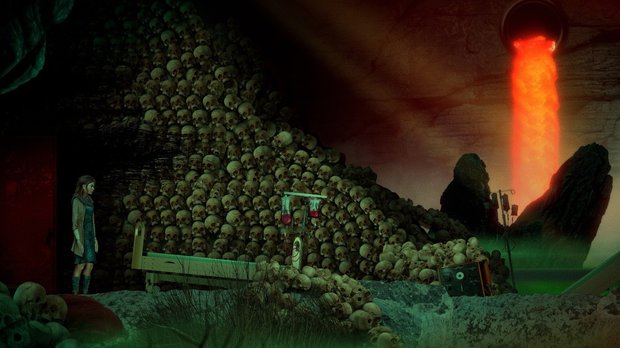
- 3 Comments
Another searingly powerful Rem Michalski horror adventure
Does it ever feel like human compassion and kindness seem to be in short supply? If you’ve given your life over in service of others, what would you do if you found out that you didn’t have much longer to live? Continue serving? Give up? Be selfish? In Harvester Games’ Burnhouse Lane, you’ll be presented with that choice over and over again, and under increasingly disturbing and dire circumstances. In another horror knockout from Rem Michalski and team, this game has it all, from scares to gross-outs to adrenaline-pumping entertainment.
Make no mistake: Burnhouse Lane is a very adult game; it tells you in blood red colors that no one younger than 18 should be playing, and all-caps letters above a pair of disembodied eyes clearly warn of violence, nudity, and gore. By now, if you’re familiar with Michalski’s games The Cat Lady, Downfall and Lorelai (and if you haven’t played them, I highly recommend that you do so for their sheer entertainment value and not because they’re needed to understand this outing), that warning won’t deter you, and you’ll be eager to jump in and play.
The game stars Angie Weather, a caregiver who plays Florence Nightingale to a man she falls in love with before marrying him for the briefest of moments until he succumbs to cancer. As a result of receiving the devastating news of her own terminal illness shortly thereafter, Angie decides to take on one last job to provide support for an elderly man, George, who lives out in the bucolic countryside.
While George’s regular caretaker is away, Angie must get to know George and his needs (they’re few, and they mainly involve watching TV and eating sandwiches), as well as explore the many-roomed farmhouse where he lives. Although she is a caregiver, Angie is no longer the sunniest of characters. When she encounters two dead animals in a grave, she notes, “Two lovers sleeping forever in a shared grave. I wish I were that lucky.”
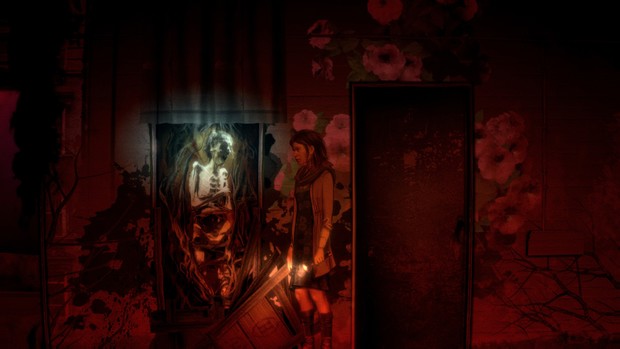
Despite her dour disposition and worsening condition, Angie has enough energy to move about this large farmhouse, which can be cozy but is also frayed around the edges. The rooms contain objects that tell the story of their occupants, like bathrooms filled with medication bottles and cupboards filled with clothes belonging to those long since passed away. As you investigate, you’ll discover that George isn’t quite so alone, accompanied by the likes of a self-proclaimed pillar of the community and man of the cloth, Rob, as well as a jovial imbecile who takes care of the farm animals, Ciaran.
Because a large and empty farmhouse can’t go unexplored, snooping will lead you deeper down, eventually into a dark and menacing basement. (Why do basements always have to be so dank and musty?) A mutilated hamster is an early indication that death is never too far away, and it isn’t long before you find yourself in the mysterious underworld of Burnhouse Lane.
The characters here are even stranger, like the kebab shop man, Omar, who’s keeping (and feeding) a terrifying secret in his own basement. There’s also Mary, whose unsubtle nickname, Bloody Mary, surely indicates that she’s up to no good. And then there’s the Burned Cat, which is enormous – and burned, obviously – and may be able to help Angie escape her deadly fate. Of course, she’ll only be able to do that if she finishes a series of tasks set for her by the mysterious feline, including getting rid of villainous characters. While these are the major tasks to accomplish, you’ll also have a variety of side tasks that may impact your eventual path through the game, including trying to make George the best sandwich you can or being sure to feed a character’s favorite pet.
There are seven chapters to the game, with each one taking you through various areas of either George’s farm or the mysterious in-between realm of Burnhouse Lane, where things are dangerous and surreal and not quite of the real world. Is it hell or some kind of purgatory? Whatever it is, Angie seems to be able to move back and forth regularly between it and George’s farm.
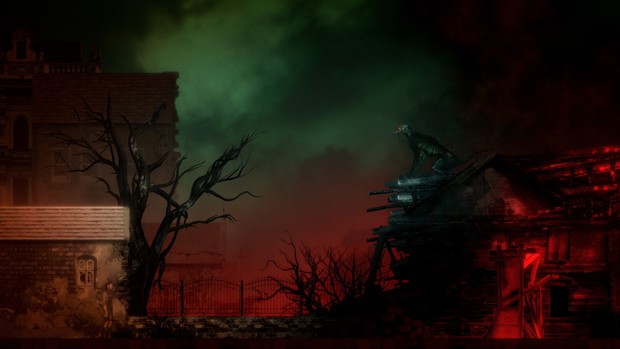
While it plays like a slow-moving side-scroller, Burnhouse Lane can be quite cinematic. The camera will zoom into George’s face during a moment of deep thought, or zoom out to take in the immensity of the burned cat. At times the camera pans will reveal something hidden and sickening, like an obese woman hidden away in a basement eating slops of food launched down at her from a trap door above.
It’s odd to find small, rare moments of serenity in the game. Most of the artwork tends toward the Grand Guignol, grotesque episodes of body horror and terror. Rooms dissolve into meaty blobs of writhing flesh, dead bodies are ripped open, and you are forced to rummage around in guts. Indeterminate body parts sit on shelves, accompanied by the awful plip, plip, plip of blood slowly dripping onto hallway floors.
However, as in previous games, Michalski punctuates these extreme horror shows with quiet touches of beauty. And he leaves it up to you to determine when to exit some of them. In one memorable scene, Angie has found the rascally old George sitting up on a barn roof. She makes her way up to him and sits quietly by his side. Soft music plays (excellently done by Michal Michalski), and you sit and watch the view and listen to the soft splatter of falling rain. You can stay here in this peaceful posture for as long as you’d like, and you get to decide when to leave this moment of zen and return back into the bloody blender of horror.
It’s recommended you play with headphones and a controller. I was able to easily play with my keyboard, though some of the later platforming elements might have been easier with a gamepad. And I would definitely suggest playing with headphones. The soundscape runs the gamut from soothing, like the calming sound of wind blowing through leaves, to the hideous, like the wretched sloppy chewing noises of something menacing just off-screen, or the horrifying crack of small bones breaking as you snap someone’s fingers. At one point I could hear the cries of a baby wailing, maybe more than one. The keening grew louder and more voluminous, and it seemed to transform into cats caterwauling. It was a distinctly eerie moment driven purely by audio.
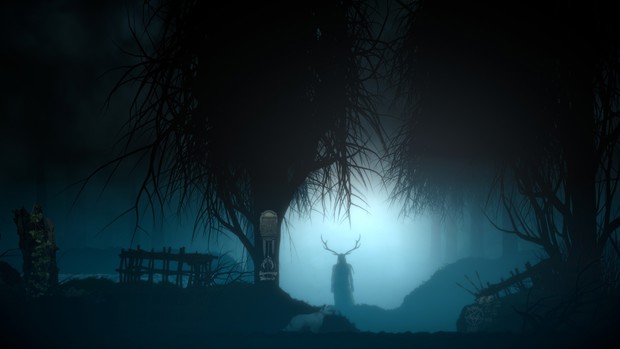
The acting is solid, with Angie, voiced by Elizabeth Nightingale, sounding weary and at times deadened. The standout actor by far is Davey Cadaver as the Burned Cat. His voice is enticing, with a dreadful gravelly undertone that I could listen to all day. Others honed their sinister voices to a sharp point – one sexual torturer had such a threatening voice, my skin prickled every time I heard it. Madison Mitts plays an American actress with just the right amount of pluck and energy.
Michalski is masterful at using music to set the tone, ratcheting up the tension. In one scene you have to make an awful decision: do I or don’t I step up on that chair beneath the dangling noose? The music pumps louder and louder with skittering violins, and you are almost forced by the score to make a particular choice to just end the noise. In another, the wavering tones of Edith Piaf singing “La Vie en Rose” pierce the air as a bound-up naked woman screams into the darkness.
Burnhouse Lane provides you with many choices, whether about dialogue (should I be mean or not?), actions (should I use this special ability at this time?), or items (should I use this special item at this time?). Your decisions can make certain fights easier (or harder), and can even help you achieve the elusive golden ending (which, sadly, I did not). Each time you make a dialogue choice, the screen will brighten around its edges, but this feedback is vague and not enough to tell you if you’ve made the “right” choice or how that decision will impact the game’s final outcome.
No matter your choices, you should save whenever you’re able as you can definitely die in many gruesome ways. You record your progress, ironically given the protagonist's health issues, by smoking a cigarette at designated ashtrays throughout the game. These are placed at strategic points, and there were only a few times where I wished for more save points to avoid having to replay longer sections of the game if I died (and indeed one time I did).
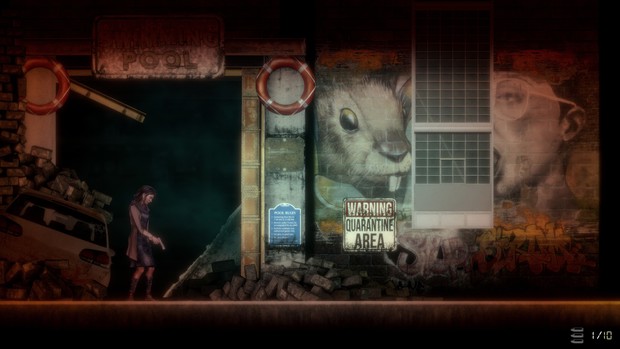
With the keyboard, pressing E will interact with the world, whether that’s climbing stairs, using objects, or digging through bloated stomachs for keys, ugh. At times the W key is needed to aim a gun and then the spacebar to shoot. Finally, holding down shift plus an arrow key will make Angie run, with the space bar used to dash or jump.
Shooting in the game never requires aiming. These exercises are more about timing; fire at the right time, and at the correct targets, and you will succeed. The timing felt a bit awkward and at times unresponsive to me, but it provided a decent amount of challenge without being impossible for someone with slower reflexes (me!).
Not content with having one set of mechanics, Burnhouse Lane offers a variety of ways to interact with items. Some things you use will have limited uses; for example, guns will have limited ammo, or flashlights will have a percentage meter for their batteries. I almost never ran out of any particular needed item, but I saved often, and on those occasions where I thought I might run out of, say, bullets, I was able to pick up from a previous save and choose my targets more judiciously.
As the story progresses, you will pick up several special abilities, all related to cats. (“Cats know things we don’t.”) These include being able to force a character to speak the truth, to animate dead bodies, and to possess a cat. This ability allows you to enter places that Angie could not possibly get into, but it involves some mild platforming that some might find tricky to navigate. Some of your newfound powers have limited uses, and the possessed cats themselves are not immortal, so you lose the ability to inhabit one if the cat is killed. I thoroughly enjoyed the variety these elements added to the gameplay.
Environmental and inventory puzzles round out the gameplay, where you use items or have to observe clues from your surroundings to unlock a range of locked doors, safes, etc. Many of these are straightforward and logical, but at least one blocked me for about half an hour, experimenting with a plethora of different permutations (switches on, objects moved in one direction; switches off, objects moved in the other direction). The solution didn’t seem to be something I could have gleaned from clues around me, and was a frustrating exercise in trial and error.
For Angie, however, the occasional frustrating puzzle is certainly not all she needs to worry about. Up until she discovers the world of Burnhouse Lane, Angie doesn’t seem to have much to live for. However, as she progresses she learns that she’s not as alone in the world as she thought. Over the course of 14 hours, I thoroughly enjoyed meeting the bizarre, lonely, if sometimes scary, characters who made Angie’s life feel a little less empty. Besides the aforementioned Omar, the friendly kebab seller who has terrible taste in women; there’s Aarno, a serial killer groupie who studies the demented minds of murderers with just a bit too much zeal and carries around a deadly axe; Ben the Barber, who just wants to give one more dazzling styling; and Mr. Fox, a mysterious man/fox who is shrouded in menacing silence, among many more. Some of the villainous characters are very one-note, with no complexity or depth. They’re evil just to be evil. This would have been a bigger flaw if the other characters weren’t so engaging and well-rounded. I felt truly moved at the unfortunate ending for one of the characters, given how much I had interacted with and tried to help them.
Sometimes the horrors didn’t give me any time to think. There are so many jump scares in this game. My notes are filled with “I gasped!” and “OMG!” Other times I was given the chance to ruminate about the nature of the world Angie was exploring and the people in them: Who exactly are the Burnhouse Lane characters? Are they real people? Facets of Angie’s own personality? Do they represent her devouring desires? And the villains in real life, are they actual villains, are they real? If Angie kills them, is she a murderer? Burnhouse Lane isn’t afraid to push you to the edge in terms of what it asks of you. And as you contemplate committing horrific acts to try to save your own life, you do get to make that choice: Do I help myself at the expense of everyone else? I made my decisions, and even though I was frustrated at the ending I received, looking back now, I believe I did make the right choices for me.
Final Verdict
What a wonderful game that shocks you, horrifies you, makes you think, even if things don’t always turn out like you hoped. I’m glad I took the plunge into Rem Michalski’s latest beautifully disturbing supernatural adventure, despite (or because of) how horrified I often felt by what I saw and even pondered doing. Compared with the developer’s previous outings, it is a satisfying evolution of narrative style and gameplay elements that he has developed over the years, but whether or not you’ve played those games, don’t be afraid to jump into the dark world of Burnhouse Lane for a gripping, thoroughly entertaining experience. To paraphrase Angie’s own words: The only people who should be afraid of dying are those who haven’t lived yet.
Hot take
Rem Michalski’s Burnhouse Lane is creepy and inviting all at once. It puts you through the emotional wringer, and isn’t afraid to push you beyond the bounds of acceptability. If you are up for the challenge, you’ll be in for one hell of a ride.
Pros
- Terrific melding of gameplay and atmosphere
- Compelling story about a dying woman trying to make sense of her life
- Unrelenting horror imagery punctuated by poignant moments of beauty
- Many memorable scenes underscored by wonderful sound work
- Engaging voice acting
- Jump scares are surrounded by deeper notes of horror, providing for a meaningful narrative
Cons
- Certain puzzles can be frustrating without enough clues provided
- A bit of light platforming might put some players off
Merlina played Burnhouse Lane on PC using a review copy provided by the game's publisher.

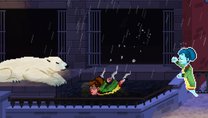

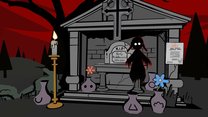
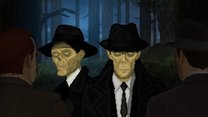
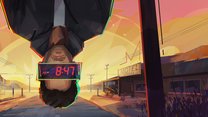
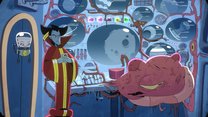

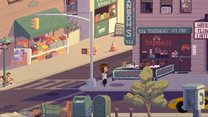
3 Comments
Want to join the discussion? Leave a comment as guest, sign in or register in our forums.
Thank you for your review. Good to know you recommend headphones. This sounds like something I will enjoy.
Reply
How come I can't see the review
Reply
Good question. It's showing fine for me just now. What browser are you using? And have you noticed a similar issue with any other articles?
Reply
Leave a comment